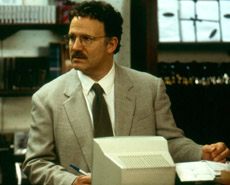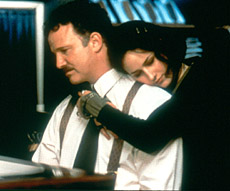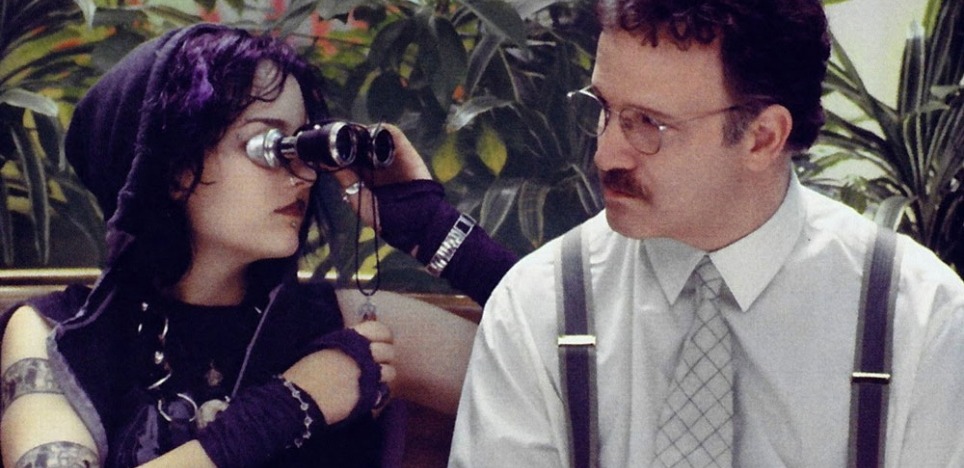"From the rocking horse to the rocking chair, friendship keeps teaching us about being human," Letty Cottin Pogrebin observes in Among Friends. In her debut as a feature film director actress Christine Lahti focuses on the unusual and always surprising friendship between a lonely middle-aged man and a rebellious seventeen-year-old girl. Despite their many external differences, they discover they have a lot in common. For our review of the film and a plot synopsis, click here.
Cross-generational friendships are often very special, especially for the ways they nourish the soul. In this drama, written by Jill Franklyn, the characters’ unfolding relationship is transforming. It releases them from the prison of fear, expands their hearts, and opens them to the redemptive power of love. The questions in this Values & Visions Film Guide focus on suffering, fear, the natural high of friendship, educating your demons, praying with the dead, opening our hearts, and being with the dying.
My First Mister runs 108 minutes and is rated R for language and some sexual material.

1. FAMILIAR SUFFERING
"People have a hard time letting go of their suffering. Out of a fear of the unknown, they prefer suffering that is familiar," Thich Nhat Hanh writes in Fragrant Palm Leaves.
- Jennifer is the teenage "other" that many of us don't want to deal with. Everything about her is designed to rub against an established way of life. What do you find most troubling about Jennifer's lifestyle and behavior? What aspects of her character do you find appealing?
- Have you ever been in a place where your suffering was so comfortable and familiar that you didn't want to pull out of it? Describe the situation. What spiritual practices have helped you face the unknown?

2. KNOWING WHAT MAKES YOU AFRAID
In Joyce Rupp's Dear Heart, Come Home, Kathleen Norris is quoted: "Fear is not a bad place to start a spiritual journey. If you know what makes you afraid, you can see more clearly that the way out is through the fear."
- At one point, Randall admits he's frightened of almost everything — many forms of transportation, elevators, sleeping. How have his fears affected his lifestyle?
- What fears of yours have been most prevalent recently? Do you try to hang out with them or run away? What do you think Kathleen Norris means when she says, "Fear is not a bad place to start a spiritual journey"?
3. A NATURAL HIGH
"It is one of the natural highs in life to discover that there is a human being who responds to me and I to him. Friendship breaks through a person's shell so that he can taste and experience life more fully," according to Eugene Kennedy in Ken Druck’s The Secrets Men Keep.
- What is the most unusual thing about the start of Jennifer and Randall's friendship? How do they both respond to this unlikely event?
- Think back over your past and recall any experiences you have had in a friendship with someone who was totally unlike you. What did you learn about yourself through this unusual relationship? What friend helped you to break through your shell so that you could taste and experience life more fully?
4. EDUCATE YOUR DEMONS
In Quest for the Grail,, Richard Rohr writes: "In the spiritual life, nothing goes away. There is no heavenly garbage dump. It's all here, wherever we are. Everything belongs. . . . Even our demons do not go away. As Robert Bly wisely said: 'You don't get rid of demons, you just educate them.”
- Jennifer admits to Randall that she's not good with emotions, and he reveals to her that it's hard for him to envision breaking out of his set ways. How do they help each other educate their demons? What scene in the film best illustrates just how difficult this is for each of them?
- At what point in your spiritual journey did you realize that there's no heavenly garbage dump where you can deposit all the toxic waste of your life? What spiritual rituals have been useful as you’ve tried to educate your demons?
5. PRAYING WITH THE DEAD
In Stories of Awe and Abundance, Jose Hobday writes: "In spring and summer I frequently pray while walking in cemeteries. I got in the habit of doing that in Arizona, where it is dry and there isn't much grass, except in the cemeteries which are watered and maintained. As a result I learned to pray with the dead. That's a great way of praying — in the presence of the dead. The cemetery I walked in was green and grassy. It was all mine. Rarely did anybody invade my meditation place."
- Jennifer communes and communicates with her beloved dead grandmother in a cemetery. Share your responses to the scene when she takes Randall there.
- What is your view or experience of communicating with the dead? Do you believe they intervene in our affairs?

6. OPENING OUR HEARTS
"When we open our hearts to each other we allow grace to enter. It is as simple as that. And suffering — events that break open the heart — can become the refiner's fire that leaves us fully open to the truth about love and compassion," Kathleen A. Brehony writes in Ordinary Grace.
- Once Jennifer and Randall truly open their hearts to each other, they are graced; she enables him to have a meaningful rendezvous with the past, and he blesses her with a passport to a new future. What do they learn from each other about love?
- Share a story about any recent experience of grace you've had as a result of opening your heart to someone close to you.
7. BEING WITH THE DYING
In May I Walk You Home?, Joyce Hutchinson states: "Being with the dying is one of the most intimate experiences on this earth. It is very much like being in the delivery room as a baby is being born, and we all know what a miracle that is. Well, being at the other end of a person's life as he or she is preparing to be born into eternal life is as great a miracle."
- Talk about any feelings you had during the scene of the dinner party at Randall's house. What does Randall mean when he says, "It's just one of those small but enormous things?"
- Talk about the end of the film. Where do you find evidence of transformation?
- Have you even been with a dying person and witnessed the miracle at the end of life? Share your story.
This guide is one in a series of more than 200 Values & Visions Guides written by Frederic and Mary Ann Brussat. Text copyright 2001 by Frederic and Mary Ann Brussat. Photos courtesy Paramount Classics. This guide is posted as a service to visitors to www.SpiritualityandPractice.com. It may not be photocopied, reprinted, or distributed electronically without permission from Frederic and Mary Ann Brussat -- except it may be duplicated for use by groups participating in the e-course "Going to the Movies as a Spiritual Practice." For other uses and for a list of guides in the Values & Visions series and ordering information, email your name and mailing address to: brussat@spiritualrx.com.
